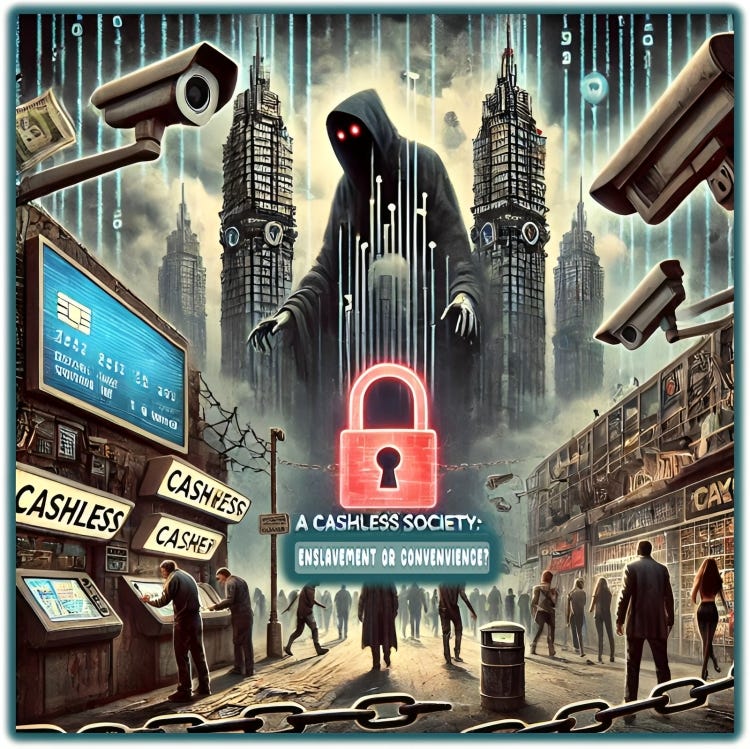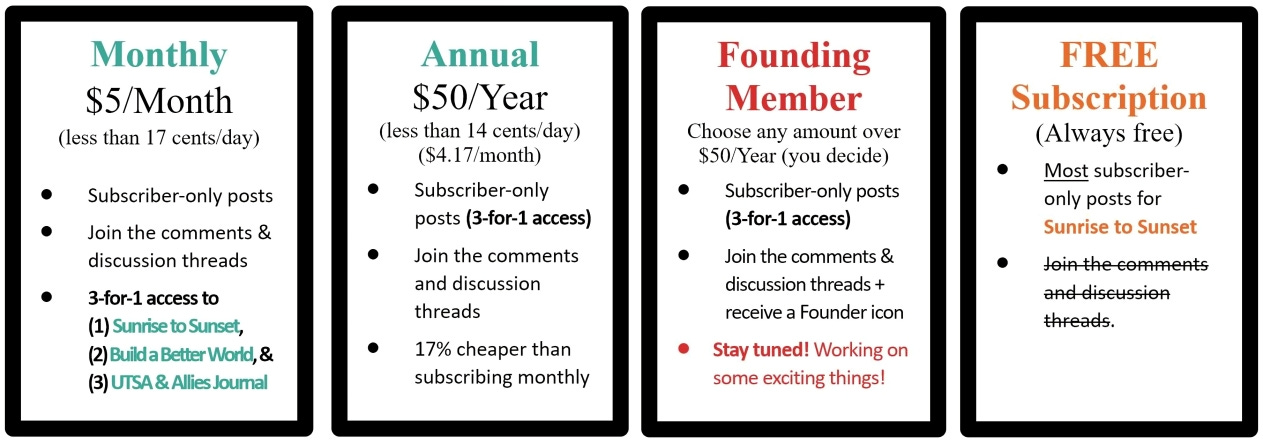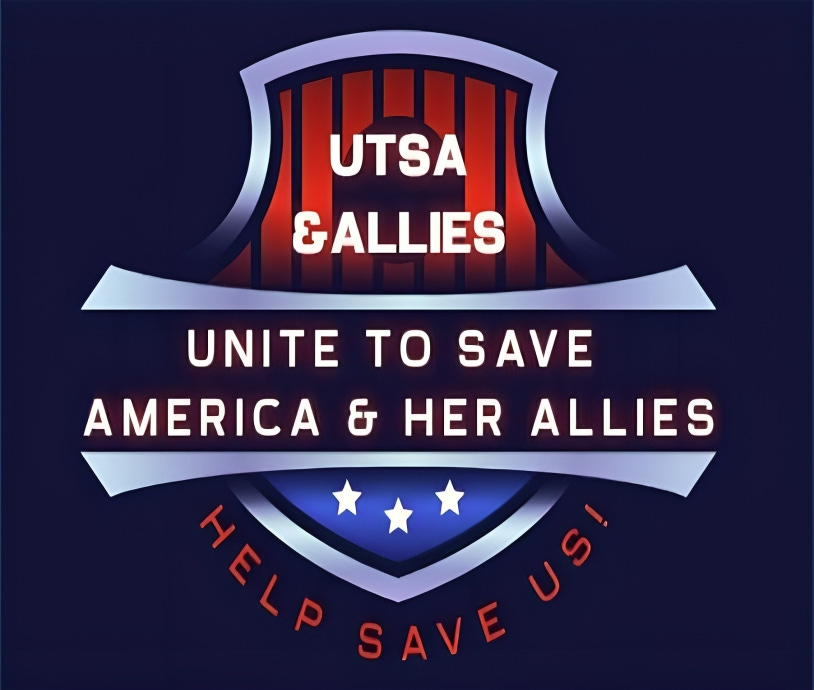We are all F*%cked (Enslaved) if a Cashless Society Ever Materializes
The Dark Reality Behind the Push for a Cashless Future
By Nadine Safron

Imagine a world without cash. No more jingling coins, no more crumpled bills—just sleek, digital transactions. Sounds convenient, right? Think again. This utopian vision quickly morphs into a dystopian nightmare once you peel back the layers. A cashless society doesn't just streamline payments; it flings open Pandora's box, unleashing control, surveillance, and stark inequalities. Let's unpack why this shiny, cashless future might just be the chains that bind us.
Global War on Cash: The Real Motivations and Risks
The Stakeholders in the War on Cash
Consumers: Seduced by convenience, reward points, and ease of use, many consumers embrace cashless payments, often overlooking the broader implications.
Big Business: Eager to expand their digital footprint and streamline operations, businesses push for cashless systems that boost productivity and profits.
Transaction Facilitators: Banks, credit card companies, and fintech firms champion cashless transactions, not just for efficiency but to rake in hefty transaction fees and harvest valuable consumer data.
Regulatory Bodies: Governments advocate for cashless economies under the guise of curbing money laundering and tax evasion, while also slashing the costs of minting and managing physical currency.
Case Study: Sweden's Approach to Cash Usage - What Does Sweden Understand That the CCP-Influenced Democratic Party Overlooks (Or Perhaps It’s Not an Oversight)?
Current Status of Cash Usage in Sweden
As of 2024, cash usage in Sweden is notably low, with only about 8% of Swedes using cash for recent purchases in 2022, a sharp decline from 40% in 2010. This trend underscores a shift towards electronic payments as the dominant transaction method. Despite the prevalence of digital payments, there is a rising concern among Swedish policymakers and financial authorities about the risks and implications of a fully cashless society.
Government and Central Bank Response
In light of these concerns, Sweden’s central bank, the Riksbank, has advocated for urgent legislative measures to preserve cash as a viable payment option. The Riksbank stresses that access to cash is crucial for inclusivity, particularly for those who may be digitally excluded or find electronic payment methods challenging. They emphasize the importance of cash for national preparedness during crises.
To safeguard this, the Riksbank has proposed legislative amendments that would mandate businesses to accept cash payments for essential goods and services. This initiative is aimed at protecting consumer rights to choose cash and ensuring its availability as a payment option alongside digital methods.
This case study illustrates a balanced approach to maintaining cash as a viable payment method while embracing the convenience of digital transactions, highlighting the proactive steps taken by Sweden to address the potential downsides of a cashless society.
Case Study 2: Ireland's Legislative Response to Cashless Trends
Following Sweden's proactive measures, other governments are also recognizing the potential dangers of a cashless society. Ireland, for instance, has taken significant steps to ensure the continued viability of cash transactions.
Overview of the Irish Legislation Being Introduced
The Irish government has recently introduced the Access to Cash Bill, which mandates that essential businesses like supermarkets, pharmacies, and convenience stores must accept cash payments. This legislation is part of a broader initiative to safeguard the role of cash in the economy and prevent financial exclusion for those who depend on or prefer cash transactions.
Key Provisions of the Law
Mandatory Acceptance of Cash: Essential services are required to accept cash unless they explicitly state otherwise, marking a departure from previous practices where businesses could opt out of accepting cash if they notified customers.
ATM Accessibility: The bill includes measures to ensure a sufficient number of ATMs are available per population, especially in rural areas, to maintain reasonable access to cash.
Regulation of ATM Operators: Operators of ATMs will now be regulated by the Central Bank of Ireland, which aims to ensure transparency and fairness in the fees charged for cash withdrawals.
Rationale Behind the Legislation
The drive behind this bill is to address financial exclusion concerns, particularly for vulnerable populations such as the elderly and those without digital banking facilities. A 2023 survey showed that a significant majority of Irish adults still utilize cash, underscoring its ongoing relevance in daily commerce.
Implementation Timeline
The new regulations are slated to take effect later this year, pending the completion of the finalization and implementation stages by the relevant authorities.
In summary, like Sweden, Ireland is taking decisive steps to preserve cash as a crucial payment option, reflecting a commitment to inclusivity and accessibility in financial transactions amidst a digital shift.
The Psychological Impact of Cashless Transactions
One often-overlooked advantage of cash transactions is the natural restraint they impose on spending. Handing over physical cash creates a tangible sense of loss, which helps regulate spending. However, cashless transactions blur this connection, making it easier to spend more without feeling the immediate financial impact. Professor Drazen Prelec from MIT highlights that the mental cost of spending via credit cards is perceived to be about half of what it actually is, leading to increased and often reckless spending. Casinos have long utilized chips as a primary medium of exchange for gambling activities, and this practice is rooted in similar psychological and practical reasons. One of the most significant factors is how chips influence spending behavior among players – you spend more freely when you are using something other than cash. It hurts to spend cash, because you can see, touch, and understand the loss more easily!
The Risks for Millennials and Financial Mismanagement
Millennials are at the forefront of the shift towards a cashless society, yet startlingly, only 24% demonstrate adequate financial literacy. This fervor for digital payments, paired with a deficit in financial education, sets the stage for poor money management. The simplicity of cashless transactions often encourages overspending, spiraling into debt and financial instability with potential widespread economic consequences.
These insights underscore that while a cashless society may offer convenience, it also introduces significant risks that warrant careful consideration.
The Looming Threat: A Cashless Society
A cashless society is often hailed as the pinnacle of modern convenience—cleaner, faster, and more efficient. Yet, the reality unveils a more sinister picture. Imagine a world where every transaction you make is meticulously tracked and logged. Governments and corporations would know precisely where you spend your money, what you buy, and how often (ladies, just think about that for a minute 😉!) This isn't convenience; it's comprehensive surveillance.
Unveiling the Digital Currency Dystopia: Insights and Expert Opinions
Discover the truth behind the push for Central Bank Digital Currencies (CBDCs) and the profound implications for your freedom and privacy. Watch Tucker to gain further perspectives on the dangers of a cashless society and government overreach.
Government Overreach and Control
In a cashless world, the government could easily exert control over your financial life. Don’t agree with a particular policy? Imagine your bank account being frozen because of your political stance. Think that’s a reach… it’s already happened just North of the border (remember the Canadian truckers who stood up against COVID vaxxes). Digital currencies can be programmed to restrict certain purchases. Want to buy a firearm? Too bad, the government has flagged that transaction as prohibited. Even everyday items could become restricted. Carbon limits on expenditures might mean you can’t buy certain products because you’ve exceeded your “carbon footprint” for the month. Say goodbye to meat and hello to Bill Gates’ mosquito burgers.
The Privacy Dilemma: Why CBDCs Could Endanger Your Freedom
In this video, experts discuss why Central Bank Digital Currencies (CBDCs) might be more aligned with China's goals than American values. Delve into the implications of a digital currency system where your every move could be tracked, and learn why many Americans are concerned about this shift.
Cybersecurity Nightmares
The shift to a cashless society dramatically escalates the potential for cybercrime. Hackers could obliterate your life savings with just a single keystroke. System failures might leave you completely stranded, unable to access your funds. Moreover, the risks of digital fraud and identity theft loom large; your financial data could end up on the dark web, leaving you to untangle the mess.
Exclusion and Inequality
The transition to a cashless society would leave millions behind. Elderly people, who might not be tech-savvy, could struggle to adapt. The unbanked and underbanked, who rely on cash, would be excluded from the economy. Social inequality would skyrocket as the gap between those with access to digital finances and those without grows wider. In emergencies, when digital systems fail, those who rely solely on cash could find themselves completely cut off.
The Exclusionary Reality: A Digital Currency Test Fails
Watch this eye-opening video about a Chinese American girl visiting China who faces a stark reality of digital currency exclusion. Unable to pass the facial recognition test on her mobile phone, she finds herself unable to spend her digital currency. This real-life example highlights the growing issues of exclusion and inequality in a cashless society, illustrating how tech-dependent systems can leave people stranded.
Enslavement and Control
At the core of a cashless society is the issue of control. Imagine a scenario where funding a political opponent is impossible because every transaction is monitored and potentially restricted. This goes beyond mere convenience—it's about power. When the government has control over your finances, they essentially control you. They can freeze your accounts, monitor your expenditures, and limit your financial freedom, representing a profound form of control and enslavement.
The Underground Economy: A Hidden Giant
The underground economy, also known as the shadow or black market, is a substantial part of economic activity, accounting for between 6.4% and 12% of the U.S. GDP. With the GDP standing at approximately $27.06 trillion, the underground economy's value ranges from $1.73 trillion to $3.25 trillion. Transitioning to a cashless society could severely impact this crucial sector, potentially pushing many workers into poverty. Local markets, babysitters, handymen, and countless others who depend on cash transactions would face devastating consequences.
The Trump Card
This issue transcends political lines and should be a unifying concern. Trump has pledged to prevent a shift towards a cashless society, recognizing the risks it poses to financial freedom. His stance is that preserving our ability to use cash is crucial for protecting our rights. A vote for Trump, he argues, is a vote against financial control. It's a call to unite in safeguarding our financial liberties.
Trump vs. Digital Currency: A Fight for Freedom
Watch Trump and Fox News interviewers sound the alarm on the dangers of digital currencies. Explore their arguments about how CBDCs could lead to increased government control, carbon limits, and potential abuse of power. This video sheds light on the risks of losing financial freedom in a cashless society.
20 Reasons No One Should Want a Cashless Society
Privacy Concerns: Every purchase becomes a data point.
Increased Surveillance: Big Brother can track every move.
Potential for Hacking: Cybercriminals have a field day.
Cybercrime Risks: Identity theft and fraud skyrocket.
Digital Fraud: Easier to manipulate transactions.
Dependence on Technology: Tech failure means no money.
Exclusion of the Unbanked: Millions left out of the economy.
Limited Access for Elderly: Older generations struggle with tech.
Loss of Financial Autonomy: Banks control your money.
System Failures: One glitch and your finances are frozen.
Blackouts Affect Transactions: No power, no money.
Data Breaches: Your financial info isn't safe.
Higher Transaction Fees: Banks and companies profit.
Bank Errors: Mistakes with no quick fix.
Financial Tracking by Companies: Ads targeted to your spending.
Limited Personal Budgeting: Harder to manage than physical money.
Potential for Discrimination: Biased algorithms affect access.
Social Inequality: Rich get richer, poor get poorer.
Exclusion During Emergencies: Disasters cut off digital access.
Overreliance on Digital Infrastructure: Tech issues cripple the economy.
20 Reasons No Liberal (Even Far Leftees) Should Want a Cashless Society
Increased Government Control: Say goodbye to freedoms.
Risk of Digital Currency Manipulation: Values manipulated by the elite.
Loss of Cash Jobs: Gig and informal work disappears.
Issues with Currency Exchange: Travel becomes complicated.
Potential for Digital Divide: Poor vs. rich access to tech.
Impact on Small Businesses: Fees and tech adoption hurt local shops.
Complex Technology Adoption: Not everyone can keep up.
Loss of Anonymity: Every transaction is tracked.
Misuse of Financial Data: Companies exploit your info.
Security System Costs: Expensive security measures.
Potential for System Monopolies: Big Tech & government control the economy.
Risk of Currency Devaluation: Digital money easily devalued.
Loss of Cultural Traditions: Cash gifts and traditions disappear.
Impact on Informal Economies: Street vendors and markets suffer.
Reduced Charitable Giving: Spontaneous donations drop.
Dependency on Banks: Total reliance on financial institutions.
Vulnerability to Policy Changes: One law changes everything.
Potential for Digital Poverty: Digital exclusion creates a new class.
Ethical Concerns with Data Use: Questionable use of financial data.
Impact on Tourism: Visitors struggle without local cash.
20 Reasons No Conservative Should Want a Cashless Society
Reduced Freedom of Choice: Forced into digital transactions.
Economic Control by Tech Companies: Silicon Valley and government control your money.
Loss of Personal Control: Every transaction scrutinized.
Mismanagement of Digital Assets: Glitches and losses.
Potential for Financial Exclusion: People left out of the economy.
Complicated for Low-Income Individuals: Barriers to access.
Increased Bureaucracy: More red tape for simple transactions.
Potential for Digital Errors: Mistakes affect your finances.
Difficulty in Tracking Small Expenses: Small cash purchases gone.
Reduced Access in Remote Areas: Rural areas left behind.
Erosion of Privacy: No more anonymous transactions.
Government Overreach: Unchecked access to personal finances.
Increased Surveillance: Every purchase monitored.
‘Control Over’ Spending: Limited on how you can use your money.
Risk of Seizure: Easier for governments to freeze assets.
Digital Blackouts: Power outages halt transactions.
Dependence on Infrastructure: Vulnerable to cyberattacks.
Economic Instability: Tech issues destabilize the economy.
Financial Discrimination: Biased systems control access.
Threat to Democracy: Hard to fund opposition movements.
What Can We Do to Fight the Forces Pushing for a Cashless Society
Below are suggestions from the ACLU (American Civil Liberties Union).
If you encounter a cashless store, here are steps you can take to push back:
Voice Your Concerns: Let the staff know you oppose the no-cash policy, highlighting its impact on privacy and its exclusion of economically disadvantaged and undocumented individuals.
Decline Digital-Only Payment: If you weren't informed beforehand about the no-cash policy, tell them you don’t have a credit card and watch their response. This can expose the practical downsides of a cashless approach.
Vote with Your Wallet: If feasible, exit the store without buying anything after making your stance clear. This action speaks volumes.
Leverage Credit Card Surcharges: Patronize businesses that apply a surcharge for credit card transactions, which helps level the playing field for those without cards. If you're a business owner, consider this strategy to educate your clientele.
Engage with Lawmakers: Advocate for laws that ban cashless stores, taking cues from similar prohibitions in other locales.
In conclusion, a cashless society might be portrayed as a futuristic utopia, but in reality, it is fraught with risks of surveillance, control, and inequality. Regardless of political leanings, the dangers are evident. Let’s stand together for our financial freedom and reject the notion of a cashless society. For a deeper understanding of the threats America faces and how you can contribute to the resistance, read the full article here (Death By A Thousand Cuts Part 2).
ALL ACCESS PASS
If at any point you are in a position to or want to support our work, you can get our ALL ACCESS pass to the Safron Express for just $5 per month or $50 per year. You can help sustain independent journalism that relies on people like you. Your support ensures an ad-free experience, exclusive insights, bonus content, and early access to our documentaries, videos, and content across two journals (Unite to Save America & Sunrise to Sunset). Stand with us in the fight for truthful reporting.
Thanks for reading Sunrise to Sunset! Subscribe for free to receive new posts or support our work with a pledge.
Join Us in the Fight for Freedom
Our mission on Substack is both serious and enjoyable, even during these tumultuous times. Inspired by the bravery of freedom fighters like Elon Musk and Donald Trump, we strive to safeguard the America we hold dear. Please share and repost this article to spread the message. Together, we can make a difference and ensure that the values we cherish endure.
Thank You
Thank you for watching and being a part of this journey. We hope you’ll support us and stand united in our commitment to freedom and the future of America.
Be sure to visit our sister journal at Unite to Save America.







